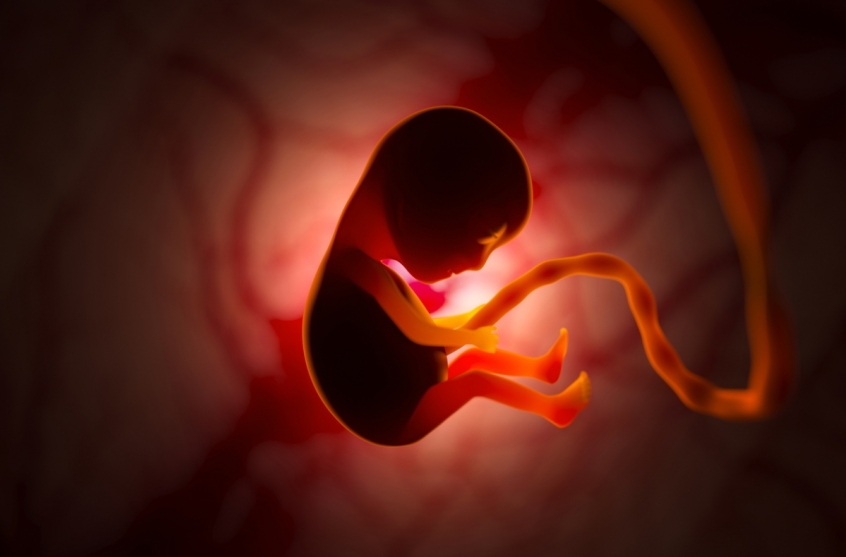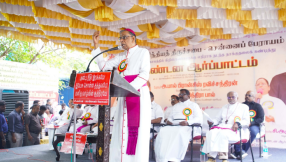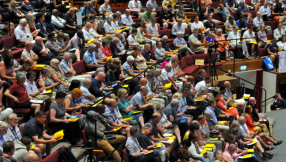
Next in our series of interviews with scientists from the Wonders of the Living World book, we meet Jeff Hardin, Professor of Integrative Biology at the University of Wisconsin-Madison. As well as his studies in science, Jeff has a Master of Divinity degree. Jeff has been involved in Christian ministry and the science-religion dialogue locally at his university, nationally, and internationally. Jeff was also featured in the previous Faraday Churches project, God in the Lab.
What got you into science?
I was fascinated by the natural world for as long as I can remember. I was raised on a steady diet of nature documentaries and I was a voracious reader of popular science writing and science fiction. In high school I took German because I was interested in physics, and many great physicists had been native German speakers.
At university my struggles with solving electrostatics problems in spherical coordinates helped me to realize – quickly – that my acumen for maths wasn't quite up to the challenge of top-flight physics.
During the spring of my first year at university my younger brother nearly died and was left painfully disfigured from bacterial meningitis, so I settled on a premedical curriculum and changed my major to Zoology.
Instead of pursing an M.D./PhD as I had initially planned, however, I took a divinely inspired detour to theological seminary before returning to academic science at Berkeley, where I fell in love with embryos (after I'd fallen in love with my wife, Susie, that is).
Can you tell us a bit about your faith journey?
I never experienced deep conflict between science and Christian faith. My parents had abandoned any sort of traditional Christianity when I was in grade school, and yet there were hints of God's splendor as a child. By the time I reached my petulant middle school years, however, I was giving little or no thought to whether God existed.
Thankfully, a classmate invited me to two events at which I heard the good news about Jesus, and in 1972 I became a Christian. I was baptized at the local United Methodist Church and grew in my faith. Later in high school I discovered the importance of the Bible at a Baptist church. In neither place was I taught that science and Christian faith were incompatible, as seems so often the case in the U.S. today.
Then I went off to university; my spiritual life plummeted by the end of my first year. Thankfully, through the help of loving people in a local student organization, I began to take my Christian faith journey seriously midway through my second year, and that journey has continued since then.
What role does wonder play in your scientific work?
Wonder is an important value for me as a scientist and as a Christian. It's what keeps me coming into work after almost forty years in professional science. Without wonder my work would degenerate into a banal affair, or, perhaps worse, an uninspired exercise in career advancement.
Inculcating a sense of wonder is my main objective in teaching embryology to undergraduates every year, quoting Albert Einstein: "The most beautiful thing we can experience is the mysterious. It is the source of all true art and science. [The person] to whom this emotion is a stranger, who no longer pauses to wonder and stand rapt in awe, is as good as dead."
I tell my students that my aspiration for them is that they be far better than "as good as dead"! If, by the end of the semester, they think embryos are cool, then I've done my job, no matter what they may forget after their exams.
Data from a recent study show that biologists tend to find complexity beautiful, while physicists are more likely to admire simplicity. Which aspects of the things you study do you find beautiful?
Well, my PhD is in Biophysics, so I'm not sure where that should place me! I think the simplicity and universality of physical law is breath-taking. My own work has focused in part on importing this law-like thinking into the world of the embryo. The forces that shape the embryo are admittedly messier and less idealized than an undergraduate physics textbook suggests, but the incredible reproducibility of development for me is beautiful. Anyone who has ever held a tiny baby in their arms can't help but be amazed at this beautiful process of self-formation – from one cell to five trillion at birth.
The same study found that 66% of scientists feel a sense of reverence or respect about the things they discover, and 58% feel as if they are in the presence of something grand, at least several times a year. Can you describe a time when your scientific research gave you a similar sense of awe?
After studying theology, my first year back in academic science at Berkeley was, quite frankly, a slog. But then I stumbled on the one developmental biologist in the Biophysics program – Ray Keller, who became my advisor. His expertise was in morphogenesis – how the embryo's body plan is built, and he used time-lapse microscopy. As I made my own time-lapse movies of sea urchin embryos, watching their developmental potential unfold before my eyes, I was completely hooked. My lab continues to place a premium on stunning images and movies of embryonic development to help others catch a glimpse of the wonders of development.
When Wonders of the Living World was written you mentioned some big questions about meaning and purpose that your work raises. Are you still asking similar questions today, or has your thinking moved on in any way?
In my embryonic development class I quote a piece of ancient Hebrew poetry, Psalm 139:
For You formed my inward parts;
You wove me in my mother's womb.
will give thanks to You, for I am fearfully and wonderfully made;
Wonderful are Your works, And my soul knows it very well...
Your eyes have seen my unformed substance;
And in Your book were all written / The days that were ordained for me,
When as yet there was not one of them.
The Psalmist knew nothing of early embryonic development, and yet – presciently –understood it as a process. "Wove" in v. 13 is the Hebrew word for knitting fabric, an apt metaphor given what we now know about the cellular choreography of development. The Psalmist also understood embryonic development as the unfolding of God's providential care over his life. Modern developmental biology reinforces these ideas of process and providence, especially when we consider our tiny beginnings.
As the Advent season approaches in the Western Christian tradition, I am even more amazed by something Christians have affirmed through the ages: that God himself has entered into these very same developmental processes through the incarnation. This is a great mystery, and a great cause for wonder!
What sorts of questions do you think you will be asking, or would like to be asking, in your work in ten (or twenty) years' time? Might your future discoveries raise even more big questions of meaning or purpose?
One of the big questions I'm wrestling with currently is the incredible directionality of embryonic development. Embryos are a resilient lot, and this directionality is robust even when things go wrong, either naturally or when researchers deliberately throw a monkey wrench into the machinery. Understanding this resiliency and the physical/chemical mechanisms that underly it is an important topic. It also raises issues regarding directionality in the larger natural world. Is the life history of our planet robust in any similar sense, and what would clearer answers mean for all of us? These are big questions indeed.
Videos, articles, study guides and a sample of the book Wonders of the Living World: Curiosity, awe and the meaning of life, are available at wondersofthelivingworld.org.













